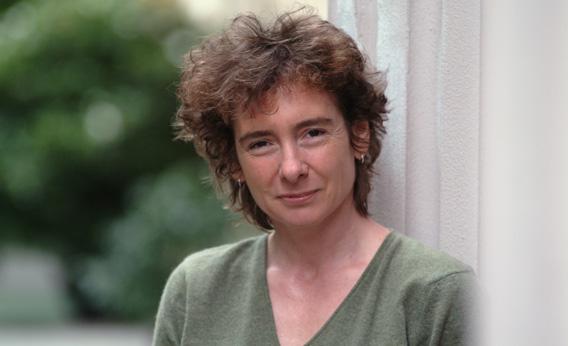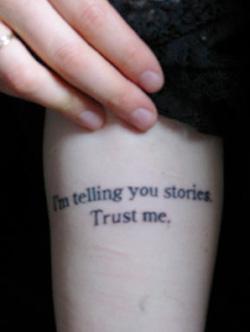Jeanette Winterson’s sentences become lodged in the brain for years, like song lyrics. “I’m telling you stories. Trust me.” “Why is the measure of love loss?” Decades after first reading The Passion and Written on the Body, those refrains send me right back to the strange, untethered moods those books once evoked.
All too often, though, the memorable lines are embedded in paragraphs that make little sense, or in dull chapters that trap the sentences like beautiful birds in a cage. In her new memoir, Why Be Happy When You Could Be Normal?, Winterson explains the genesis of her fragmentary writing style—which, naturally, lies in her own origins—and the result is just as beautiful, and just as frustrating, as her fiction. At times, she conjures the lost working-class Northern English world she grew up in with such clarity you can see the pattern on the wallpaper, or the bleakness of the coal shed where Winterson was sometimes left to sleep. But when it comes to emotions, Winterson scurries and evades like the mice her adoptive mother used to claim were manifestations of spiritual ectoplasm.
Winterson’s first novel, Oranges Are Not the Only Fruit, which appeared when she was 25, won several awards, and established her not just as a writer, but, in England at least, as a famous writer with an interesting past. The hero is Jeanette, a working-class Northerner whose adoptive mother is an evangelical Pentecostalist with peculiar, and extremely quotable, opinions. When young Jeanette falls in love with another girl, her mother arranges a traumatic three-day exorcism, but Jeanette flees the toxic home and escapes to Oxford University, just as the author did. Oranges has always been described as “semi-autobiographical,” but in Why Be Happy, Winterson refers to her first novel as “the cover version.” Now she can describe the more painful reality.
by Jeanette Winterson
Grove Press
In its second telling, the story is even more powerful—the poverty starker, Jeanette’s isolation more complete. Mrs. Winterson was cruel and thoughtless, often neglecting Jeanette in favor of her religious devotions. She was almost certainly an unfit mother, and she was quite possibly insane, but sweet Jesus is she an amazing character. Without her—the material she provided, and the fierce determination to escape what her craziness instilled in her daughter—could Jeanette Winterson have become the writer she is today? That’s the question that animates the memoir.
Winterson was raised in Accrington, Lancashire, which, as she notes, “was in the wrong decade until the 1980s.” I grew up in a very similar town 25 miles away. We also lived in a two-up, two-down with an outdoor lavatory and a life marked by the things that were missing, but unlike Jeanette, I benefited from the meritocratic social policies of postwar Britain. Whereas I—and thousands like me—received free school lunches, Mrs. Winterson refused to be means-tested, and since there was no money, Jeanette routinely went without lunch or managed with bread and cheese. It was an odd, deprived life for Jeanette, but it seems to have armed her with an energetic self-sufficiency that enabled her ambition.
When Mrs. Winterson, who despised and distrusted secular books (“You never know what’s in it until it’s too late”), discovered the stash of paperbacks hidden under literature-obsessed Jeanette’s mattress, she burned them in the backyard. The next morning, Jeanette gathered up the still-warm shards of text. “It is probably why I write as I do—collecting the scraps, uncertain of continuous narrative,” she writes 35 years later. Jeanette also learned to memorize chunks of the books that mattered to her: “I had realised something important: whatever is on the outside can be taken away at any time. Only what is inside you is safe.” Those powerful incantatory sentences that show up again and again in Winterson’s fiction are surely a byproduct of her early attempts to hold on to precious ideas by committing them to memory.

Photograph by Peter Peitsch.
These possibly too-pat explanations are typical of the credibility-stretching claims that Winterson makes throughout the book—it’s as if she wants to provoke readers to question them. Did she really hold those singed scraps of paper in her hands? Did children in the next town really line up outside the dog biscuit factory waiting for sacks of oddments that they would dip into icing sugar and eat? Did Jeanette and her girlfriend really cycle 50 miles to ask her mother why she had locked her out of the house? But since other details that will seem unlikely to some readers were part of my own childhood, I’m inclined to accept it all as true. As close to “true,” at least, as can be hoped for from a writer who declares that “part fact part fiction is what life is.”
Mrs. Winterson’s wretched excesses eventually provided the escape Jeanette longed for. After the exorcism and still more cruelty, 16-year-old Jeanette leaves home and for a while sleeps in a friend’s car. One day, she tells a widowed English teacher about her circumstances: “And so it all came tumbling out—the mother, the Mini, the library, the books.” Mrs. Ratlow immediately hands Jeanette a key to her house and tutors her for the Oxford entrance exams. When her first interview at Oxford goes badly, she arranges another chance.
When that second interview starts to go south, Jeanette dips once more into the Winterson well: “So there was nothing for it but to explain at Shrek-like speed about the Hillman Imp, and the tent, and the market stall where I worked, and a little bit about the Apocalypse and Mrs. Winterson, and English Literature in Prose A-Z.” This evocation of her mother’s extreme behavior provides Jeanette with a way out, in this case by earning her a place at Oxford, where she becomes, she is told, “the working-class experiment.” Later, of course, the larger-than-life mother provided material for Oranges, and she has now been brought back into service in this memoir.
Three-quarters of the way through the book, the action suddenly jumps ahead 25 years to 2007 and to the breakup of a relationship, the death of her adoptive father’s second wife, to Jeanette finding her adoption papers, and eventually descending into madness. Within a few pages, she is hearing voices and attempting suicide. These passages are alarming and shockingly revealing—a woman who has looked after herself so effectively since she was 16 can barely manage the basic tasks of survival—but it’s so raw and undigested, it’s hard to take in and difficult to understand. In her 1997 Paris Review interview, Winterson said, “If you want something to be clear straightaway then it’s probably better not to read my books.” That’s fair enough in a novel, but in a memoir, the saga of seeking out a birth mother—a cold, bureaucratic process that took such a toll on Winterson’s psyche—clarity feels like a reasonable request.
So, what if Jeanette had never met the Wintersons? What if she hadn’t grown up surrounded by madness and unpredictability and the language of the Old Testament? What if she had been loved?
When Jeanette finally finds her birth mother, and after a lifetime of singularity discovers that she has a half-brother, aunts, and all the accoutrements of an extended family, she’s delighted by them. They’re loving and accepting and very unlike Mrs. Winterson. But despite her abusive upbringing, Jeanette knows that “I would rather be this me—the me that I have become—than the me I might have become without books, without education, and without all the things that have happened to me along the way.” Other writers have produced more clear-eyed, insightful accounts of tracking down their birth parents—Jackie Kay’s Red Dust Road comes to mind—but never has anyone so outsized and exceptional struggled through such remembered pain to discover how intensely ordinary she was meant to be.
See all the pieces in the new Slate Book Review.
